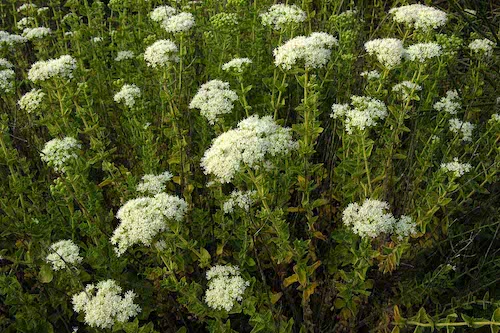(Flowering oregano)
Today, with internet and media tentacles spreading across the world, it’s easy to learn for example what they eat on the Azores or in Polynesia. However, in ancient times, there were only storytellers talking about strange people from faraway countries and big conquerors, like Alexander the Great, came home with the most wondrous things. This is how rice and cucumbers landed in the Greek kitchen. Then the Romans spread all kinds of Greek delicacies, like chestnuts, all over their conquered countries in the rest of Europe (as they did with their now favourite pizza herb, oregano – the herb that the ancient Greeks used for lots of things, but not yet for pizza).
Pizza as we know it today, was only ‘invented’ in the 18th century in Naples, but for centuries flat breads had been eaten with various toppings like cheese and dates. According to the Roman poet Virgil the Trojan Hero Aeneas was one day so hungry that he ate all the plates; plates being flatbread! Even 9th century Vikings baked topped flatbread in special wood stoves.
It was only around 1750 that in the south of France and in Italy the realization came that tomatoes, brought from Mexico by the Spanish conquerors, were not only ornamental plants, but its fruit was also edible. In those times tomatoes were still yellow, to turn red only sometime later in their history in Europe.
Combine tomatoes with oregano and you have a dream marriage. According to myth the goddess Aphrodite grew this green herb in her garden on Olympus, in order to bring joy to the world. Oregano has maintained its culinary value through time. Ancient Greeks put plenty of oregano on meat, just to prevent food poisoning, in case the meat was not too fresh. They also used the herb for luck, for example by marrying with a garland of oregano wrapped around the heads of bride and groom. Or they put a bundle of oregano under their pillow, or wore a wreath as a sleeping cap to catch nice dreams. It was also believed that oregano protected agains evil spirits and even today you may find pots with oregano standing watch over houses.
Physician Hippocrates, father of the western medicine (ca 460 – 370 BC), was also pretty busy with oregano. Since then the list of diseases that can be alleviated with oregano has been growing. The herb is full of healing substances and mighty antioxidants, good to fight cancers, skin diseases or stomach complaints. Put in hot water with honey it is a perfect drink against coughing, but it also can help ease a cold or asthma.
Oregano is also called wild marjoram and is sometimes confused with the real marjoram. Oregano has a sturdy, almost minty flavour with a bitter pinch, majoram is more sweet and mild, making it easier to combine it with other herbs. Marjoram however has many of the same healing properties and shares the same stories as oregano.
The other equally famous Greek herb, thyme, has stronger properties: it gives power, courage and encourages sacrifice. It is also a story that it was grown by a woman: Helen of Troy. What a lady! First she caused the most famous war of ancient times and then she supported soldiers with a home grown herb. Thyme was clearly the herb for soldiers. In later times the crusaders also carried thyme going to the Holy Land. During the first world war its medicinal properties were used: solutions made from thyme were a popular disinfectant on the operating tables and in the hospital wards.
Flowering thyme bushes now decorate the Greek landscape and are asking to be picked (most green herbs lose some of their power after flowering). And we really need the thyme, because now is the month that you really need power to be able to sacrifice yourself to picking those small capers from their prickling branches (before they change into exotic flowers). You will need another shot of thyme to harvest your cherry tree before the birds empty it, or to pick the prunes and apricots before the ants start climbing the trees in search of the fruit. Then you need courage to go into the boiling hot kitchen to fill big pans with fruit and cook up tons of marmalade.
And then you also have to consider the oregano waving with its white umbellifers. But that’s a happy herb – because the flowering stems just have to be bundled to dry, not a time consuming task. The only thing missing is a goddess to grow a herb to combat tiredness in these harvest times.











